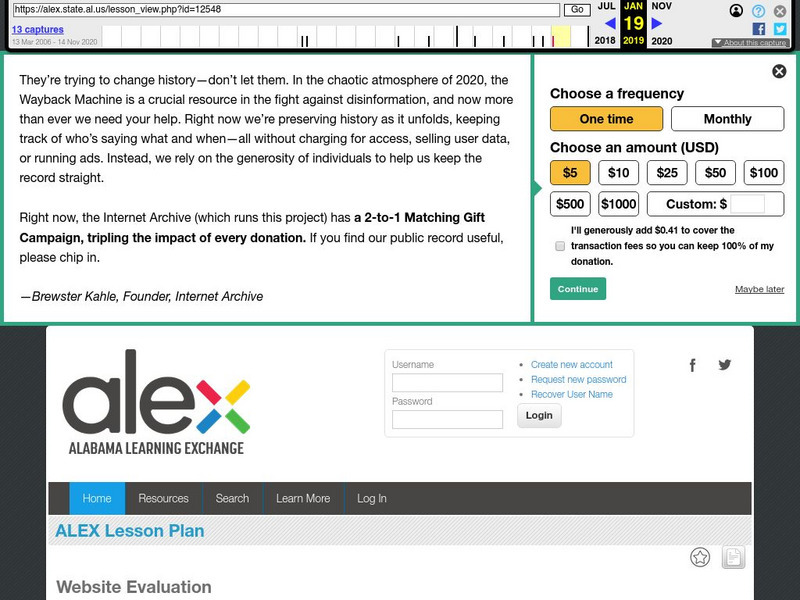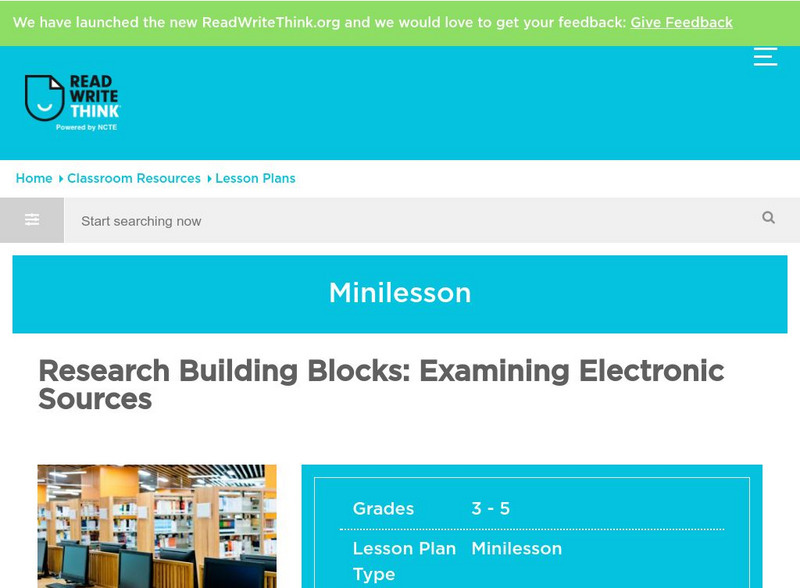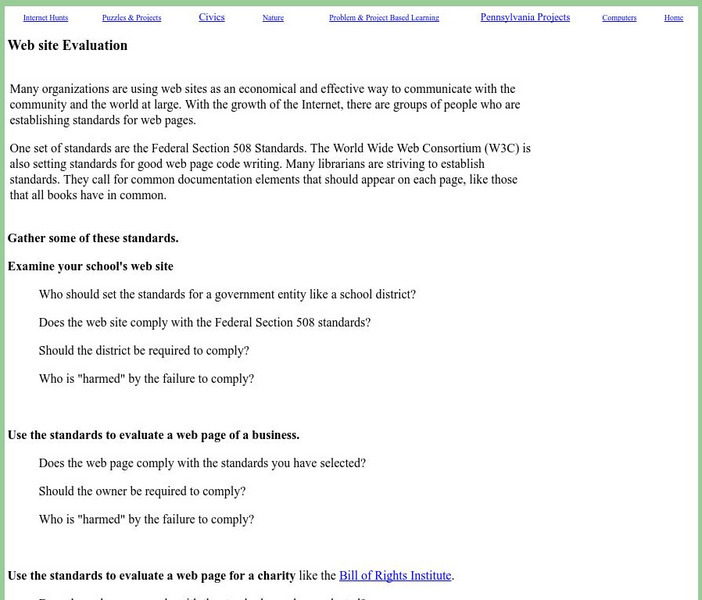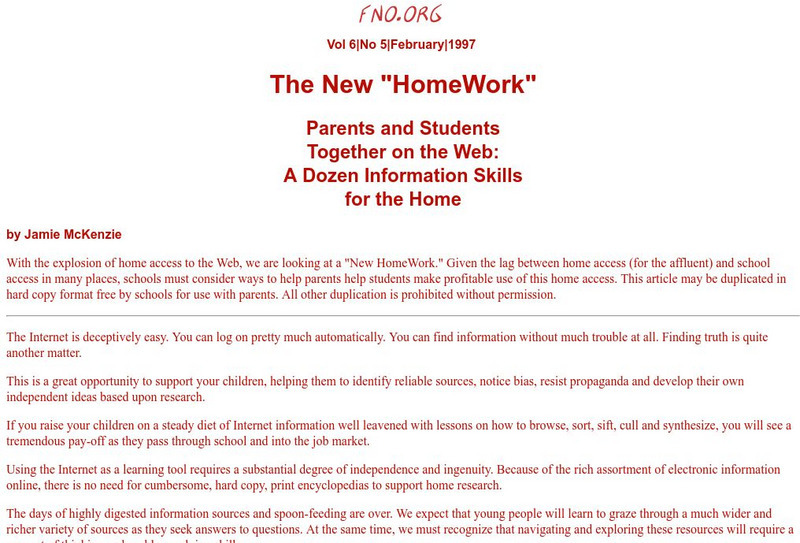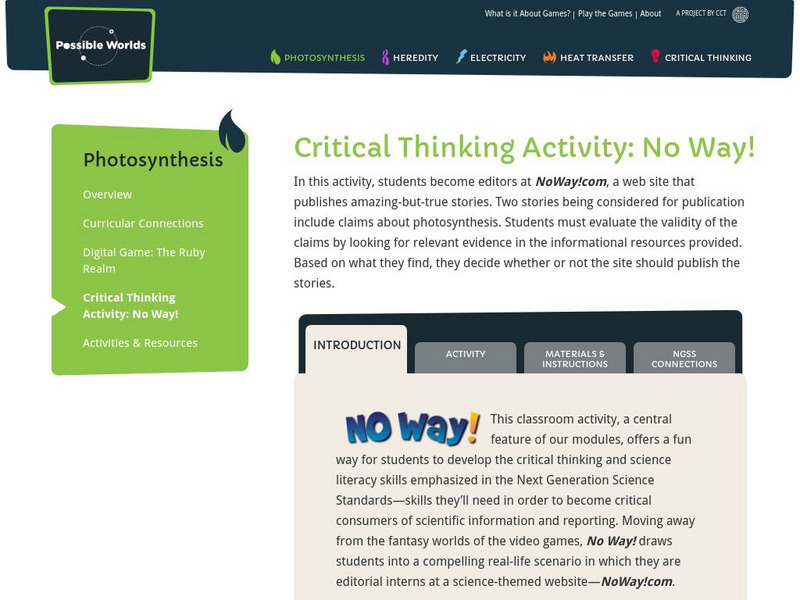Hi, what do you want to do?
Other
Kathy Schrock's Home Page: Abc's of Website Evaluation [Pdf]
Noted technology educator Kathy Schrock provides an alphabetical list of qualities to evaluate in judging websites. She provides example websites to look at for each quality. In addition, she gives a list of websites to use when...
Arizona State University
Arizona State U.: Research Success for High School Students: Evaluating Sources
A collection of resources for evaluating sources. Topics covered include knowing your sources, assessing whether a source is scholarly, the CRAAP Test (includes chart, worksheet, and website evaluation sheet), and how to identify fake news.
Alabama Learning Exchange
Alex: Website Evaluation
Utilizing a graphic organizer, students work individually and in groups to rank websites according to specific criteria.
ReadWriteThink
Read Write Think: Research Building Blocks: Examining Electronic Sources
This lesson helps elementary students identify the important components of web site evaluation. It includes a website evaluation question sheet.
Stanford University
Stanford U.: Evaluating Information: The Cornerstone of Civic Online Reasoning
This report from the Stanford History Education Group describes the conclusions of their work in field testing a set of assessments of civic online reasoning by young people from the middle school to the college level. Middle school...
REMC Association of Michigan
Remc Association of Michigan: 21 Things4 Students: 9. Search Strategies
In this learning module, students learn how to: use Michigan eLibrary, boolean logic, and dictionary.com; use search engines; choose reputable websites; cite sources; and differentiate between real and fake information. Includes an...
Sophia Learning
Sophia: Evaluating Digital Information: Tutorial
In this slideshow tutorial, students will review how to evaluate digital sources. During the digital evaluation process, students are directed to analyze the following: authority, accuracy, objectivity, and currency. After the tutorial,...
ReadWriteThink
Read Write Think: Hoax/no Hoax? Online Comprehension and Evaluation Strategies
Students use research-based comprehension strategies to read and evaluate websites, and practice analysis by comparing hoax and real websites and by identifying false or misleading information. SL.11-12.2 Eval&Integrate sources
Cynthia J. O'Hora
Mrs. O's House: Web Site Evaluation
Students will evaluate the school's web site determining whether standards exist and if they have been met.
PBS
Pbs Learning Media: Common Sense Education: Identifying High Quality Sites
Learn how to "test before you trust" the sites and information found on the Web in this lesson plan and student handout from Common Sense Education. Assessing what you find on the Web is an essential skill for today's students. Use this...
Alabama Learning Exchange
Alex: Searching for and Citing Digital Sources
Students will locate, retrieve, store, and correctly cite digital information for research projects.
Teachnology
Teachnology: Using a Web Site With Your Class
Before using any web site with students, you should make sure to thoroughly review it. This article provides five considerations to evaluate before using a site in your classroom.
Common Sense Media
Common Sense Media: Education: Right Sites: Grades 3 5
Students explore the distinctions between the quality and appeal of a children's informational website. They use both types of criteria to rate and compare children's informational websites.
Texas Education Agency
Texas Gateway: Determining Validity and Reliability of Sources
This lesson will help students decide which sources are valid and reliable for supporting a thesis. It discusses how to evaluate books, articles, websites, and more.
FNO Press
The New "Home Work" Suggestions to Send Home
Information literacy can be practiced at home as well as at school. This article offers 12 suggestions for at home projects for parents and students to do together. Good for an open house handout.
Common Sense Media
Common Sense Media: Education: Sites I Like: K 2
Young scholars explore and evaluate an informational website for children. They discover that people's opinions about the quality and usefulness of a site will vary. As a class, students view a website and identify features that they...
National Endowment for the Humanities
Neh: Edsit Ement: Introducing the Essay: Twain, Douglass and American Non Fiction
This lesson plan serves as an introduction to American literary non-fiction writing and focuses primarily on teaching some basic approaches to recognizing rhetorical strategies adopted for persuasive effect in essays and non-fiction. The...
Other
Ad Cracker
In this website students can learn to create an international advertising agency. They will learn to write a brief, create a brand and position the product. They will also be introduced to the fundamentals of creative writing as well as...
Alabama Learning Exchange
Alex: To Herb or Not to Herb
This unit allows students to research some common herbal supplements to evaluate the safety and effectiveness of the herb. Students will compare the herbal supplements to pharmaceutical medicines to judge which is the better choice....
Education Development Center
Center for Children and Technology: No Way: Photosynthesis
Learners become editors at NoWay, a web site that publishes amazing-but-true stories. Two stories being considered for publication include claims about photosynthesis. Students must evaluate the validity of the claims by looking for...
Alabama Learning Exchange
Alex: Poetry Slam
Students will locate a poem of their choice from a designated website to interpret. Students will then search the Internet for performances of the poem they select. In addition to creating a written interpretation of the poem, including...





![Kathy Schrock's Home Page: Abc's of Website Evaluation [Pdf] Activity Kathy Schrock's Home Page: Abc's of Website Evaluation [Pdf] Activity](https://static.lp.lexp.cloud/images/attachment_defaults/resource/large/FPO-knovation.png)

